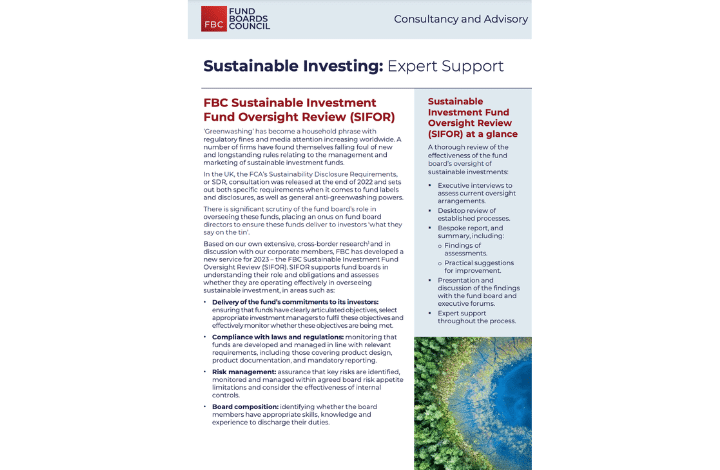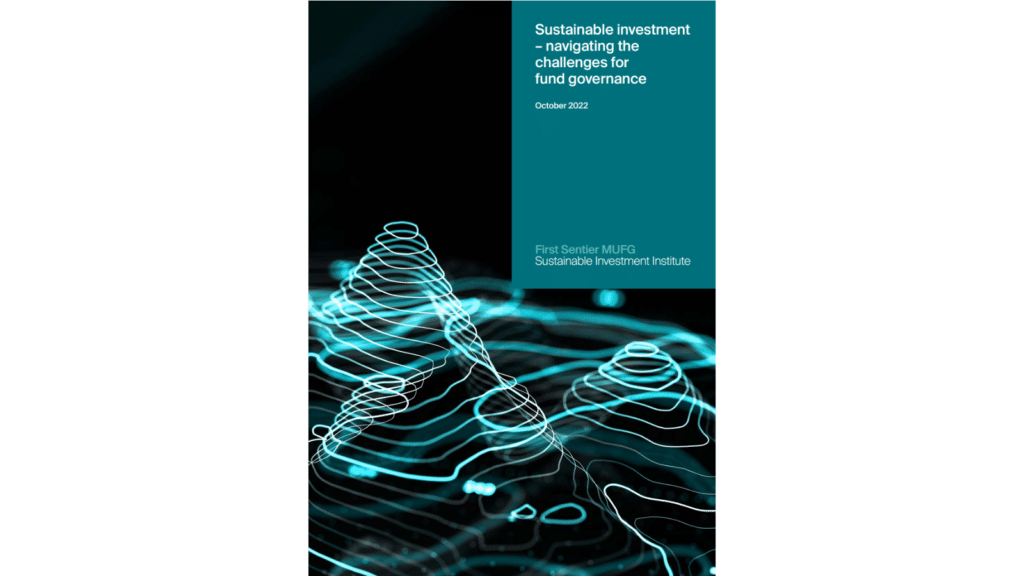Responsible investment and ESG
- Home
- |
- Responsible investment & ESG
Responsible Investment and Authorised Fund Managers (AFMs)
There are a number of key issues already confronting fund board chairs, CEOs, independent non-executive directors (iNEDs) and their executive colleagues in the debate on Responsible Investment and Environmental, Social & Governance (ESG) investing.
We continue to see scrutiny of some firms investment offering and the risks of ‘greenwashing’, including the FCA’s 19 July Dear AFM Chair letter (‘Authorised ESG & Sustainable Investment Funds: improving quality and clarity) which highlighted their expectations of improved standards in the design of ESG fund offerings.
FBC’s focus on Responsible Investing and the role of the fund board is the start of a dialogue with our corporate membership to address key issues in the Responsible Investment (RI) space including:
- What kind of ESG monitoring management information (MI) comes to fund boards? What are current best practices and what challenges are firms facing? What improvements to MI can we expect in the near future?
- Are there different requirements when it comes to how fund boards monitor ESG funds in particular vs. ‘ESG
integration’ across all funds in general? - Should fund boards have their own ESG policies for use to benchmark their investment managers’ ESG policies?
- What is the current state of play and role of third party research firms in providing qualitative research
ratings / assurance on ESG features of funds? Are fund boards making extensive use of these ratings or placing more reliance on internal / investment manager provided MI? - What is the role of the depository when it comes to providing assurance to the fund board on ESG matters?
- What is the role of the second and third lines of defence (risk / compliance and internal audit) and external audit when it comes to providing assurance to fund boards on ESG matters?
- Are investment managers and AFM businesses role-
modelling the best practices they expect from investee firms when it comes to ESG matters?
FBC Responsible Investment Activity
Meeting: What can and should AFMs being doing about Responsible Investment?
Introductions from our speakers:
Read the write up of this event, hosted exclusively for FBC members under Chatham House Rules.
FBC members can also hear what the FCA had to say on ESG and Responsible Investing at our event in December.
Products and services
Sustainable Investment Fund Oversight Review
We’ve launched a new consulting service for fund boards wanting to evaluate the way in which they oversee funds with ESG, responsible investment or sustainability objectives. Building on FBC’s in-depth research and our extensive regulatory engagement in this area, we’re offering firms a detailed, bespoke review of how their fund board oversees these funds to help identify areas of strength and opportunities to enhance their governance. This includes a key focus on controls to avoid ‘greenwashing’.

Hear more about how the Sustainable Investment Fund Oversight Review could support your fund board from FBC MD Catherine Battershill and FBC senior adviser, Brandon Horwitz, in our short video and download the information.
Please do get in touch for more information.
Report: Sustainable Investment: Navigating the challenges for fund governance
From First Sentier Investors MUFG Sustainable Investment Institute, in partnership with FBC
Assets under management in sustainable investment funds have quadrupled in just three years, accompanied by a swathe of new regulations and approaches to sustainable investing, with variations in definitions and disclosure requirements. In this rapidly evolving environment, fund board directors are grappling with:
- An increasing level of regulation and how to mitigate greenwashing risks.
- A lack of clarity from regulators on their expectations of fund board oversight responsibilities in relation to sustainable investments.
- Ensuring sufficient expertise in sustainable investing is available for robust fund oversight.
Report overview
The report highlights the governance challenges facing fund boards due to the rapid evolution of sustainable investment. ‘Sustainable investment – navigating the challenges for fund governance’ explores how fund board professionals are approaching the oversight of sustainable investment funds. Researched and authored by FBC, the report includes findings from interviews with 25 fund board directors across six jurisdictions – the UK, Ireland, Luxembourg, Japan, Hong Kong and Australia.
Watch the video:
Sustainable investing – navigating the challenges for fund governance
Glossary
Digesting the alphabet soup of responsible investments
There are a lot of acronyms involved in responsible investments, starting with RI itself! Others which are commonly used include:
Environmental, Social and Governance considerations, typically applied to an investment within a portfolio or a fund of such investments.
The broad application of ESG considerations into an investment management firm’s overall investment approach (i.e. not just the approach applied to ESG specific funds).
The UK’s Sustainability Disclosure Requirements (SDR), high level elements announced in 2021 with the aim to put detailed rules out for consultation from Q2 2022.
The broad application of ESG considerations into an investment management firm’s overall investment approach (i.e. not just the approach applied to ESG specific funds).
Refers to activities undertaken by investment managers to engage investee firms on ESG matters, including using the voting rights of equity investments to raise and support investee firm board resolutions to progress ESG initiatives (e.g. moving away from fossil fuels).
The European Union’s Sustainable Finance Disclosure Regulation which cover disclosures of sustainability risks and the degree to which ESG considerations feature in the objectives of a particular product (in force from 2019 with certain disclosures applicable from March 2021 and others from 2022).
A target of completely negating the amount of greenhouse gases produced by human activity, to be achieved by reducing emissions and implementing methods of absorbing carbon dioxide from the atmosphere.
Refers to greenhouse gases emitted by a company (such as Carbon Dioxide, C02). Scope 1 refers emissions that a company makes directly — for example while running its boilers and vehicles. Scope 2 are emissions it makes indirectly – like when the electricity or energy it buys for heating and cooling buildings, is being produced on its behalf. Scope 3 refers to all the emissions associated, not with the company itself, but that the organisation is indirectly responsible for, up and down its value chain.
Get started
Join Fund Boards Council
Subscribe to our newsletters
Keep up to date with the latest handpicked news and features relevant for fund boards.

Membership, Consultancy, Training and iNED Services for Fund Boards


